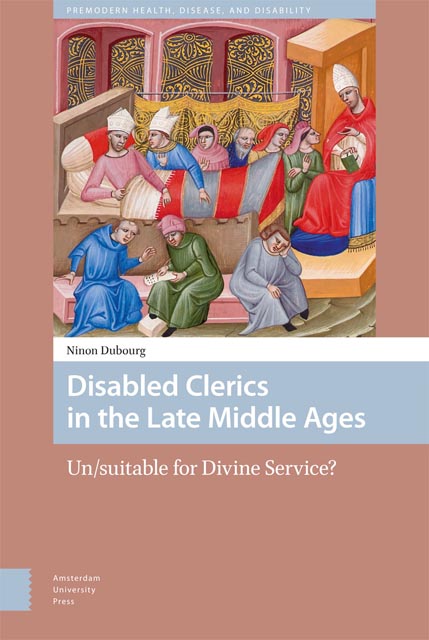Book contents
3 - Joining the Clergy
Published online by Cambridge University Press: 18 October 2023
Summary
Abstract
This chapter interrogates the tests used by the Church to determine disability. These were required at several stages of the clerical profession: canon law stipulates that all candidates applying for admission to the secular and regular orders, and all clerics wishing to receive a promotion, must be examined before their appointment. Supposedly a ‘quality-control’ measure to guarantee the uniformity of the clerical condition at all levels, this evaluation was required from a cleric's first tonsure to their entrance into the priesthood, up until his election as bishop or abbot, when the Pope himself, in theory at least, conducted the examination.
Keywords: Examination; Promotion; Election; Education; Black Death
The Papal Chancery routinely blocked the entry of disabled clerics into minor and major orders, alongside preventing their receipt of a benefice attached to the care of souls (cura animarum). Restrictions of grace of this kind were more prevalent in the thirteenth century, when the number of such promotions granted to disabled churchmen remained low. Analysis of the relevant petitions addressed to the Papal Chancery by the disabled clerics and papal letters sent in response suggests, however, an openness to the inclusion of disabled clerics within major orders in the following century. While the thirteenth century saw a large proportion of resignations by disabled secular clerics (51% of letters, compared to 15% in the fourteenth century, see Chapter 5) the pontifical institution received significantly more requests for secular promotions during the fourteenth century, with the topic figuring in 33% of letters (94) and 26% of petitions (22) in the latter period, compared to just 17% of thirteenth-century letters (32) (see Figure 3.1).
These numbers show that the pontifical institution granted graces to receive a benefice with the care of souls and/or a promotion to the major orders to disabled clerics more willingly during the fourteenth century. Indeed, the Papal Chancery authorized the request of 64% of petitioners seeking to accede to a pastoral role, that is, benefices cum cura (vs. 31% in the thirteenth century), and 77% of those wishing to join major orders (vs. 27% in the previous century). The results for petitions to join the minor orders are in line with letters of the thirteenth century, with most petitioners prohibited from joining major orders (four out of six cases), alongside fewer spontaneous requests to enter minor orders (two cases out of six).
- Type
- Chapter
- Information
- Disabled Clerics in the Late Middle AgesUn/suitable for Divine Service?, pp. 137 - 192Publisher: Amsterdam University PressPrint publication year: 2023

